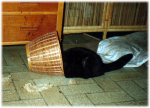Cage Dunn's Blog, page 65
May 1, 2018
If I should Die
Songwriters write hundreds of songs in their lifetimes; poets pen thousands of emotions. Lyrics spin from their minds and pen because they must, must, must be given to the world. Artists paint, composers create, playwrights play, writers write … it’s a compulsion. They don’t stop at one or two, do they?
Why then do some people keep up the elitist maxim of writers who only produce one or two works in their lifetime as being ‘better’ or more worthy or literary [as opposed to …]?
Writers write.
[image error]
In order to learn your craft, any craft, you DO it consistently, learn as you go. A mentor can only tell you so much, show you so much before they say “Go forth and Do,” and if you don’t do that, you’re an imposter. A fraud.
In the modern world, a one-story writer is trodden under the mud of millions. A one-story writer will never be found, even if the story is good. Even a five or ten story writer isn’t going to get far if they don’t do the other things writers need to do. It’s a profession, and as a professional, a writer needs to output enough work to be noticed, improve their skills enough to be taken seriously, and keep producing. It doesn’t stop at one or two. It’s not an elite art open to only those who ‘deserve’ it because [go on, name it].
I wear my heart on my sleeve, and as such people know where to stab to hurt me. Or so they think. Taking a stab at my work isn’t going to kill me, but when the words they say are said to put others off the path of this journey of writing, I’m going to get my back up.
It happened again. Every day there’s someone who writes it. The best of the best only do one or two great things, they say. History will remember their name, they say. Nothing new is worthy, they say. See that pic up there? He was lambasted for his heresy of the craft.
My response is usually one of two things: So, because you did one (or two) and then gave up, you’ll be the one remembered by history? Or: go away, naysayers not welcome (maybe said in a not-so-nice manner).
Any person who wants to be a writer will look to learning the craft. Any person who wants to call themselves a writer must be willing to put their words out to the public. The only way to learn the craft is to do the work, over and over and over, until … the end (death, that is).
And when I die, and all my stories are unpublished (yes, it’s in my will), I will be one of the millions of forgotten writers because I don’t care for posterity. I care about now.
Because the people they are for will have them, and that’s what it’s about. I’m not writing for posterity, riches, fame or literary acclaim. These stories are for certain people. I don’t mind if other people (or other beings) read them, but they were written for a particular audience and I know they’ll have their copies.
And I’m happy to help other writers learn the craft. It’s part of being a professional. I can learn as much from helping others as I can from a mentor. One day, I hope some of those I worked with will become masters of their craft. I’d like that just as much as I’d like one of my kids to become successful at something they chose.
Remember this: in order to learn your craft, any craft, you DO it consistently, learn more with each item you produce; it’s the ten thousand hour adage:
Malcolm Gladwell
10,000 Hours of Practice. In the book Outliers , author Malcolm Gladwell says that it takes roughly ten thousand hours of [deliberate and purposeful] practice to achieve mastery in a field.
A mentor can only tell you so much, show you so much before they say “Go forth and Do,” and if you don’t do that, you’re an imposter. A fraud.
So, to those of you who said it, this is my response. I hope it makes you sneeze for a week.
April 30, 2018
Guest Post | 6 Top Tips for Breaking the Rules of Writing and Living to Tell the Tale (by Charles Harris)
If you’re a writer, you will relate to this … thank you, Charles
This post was originally set out to be published during IndieAthon last month, but due to circumstances you’ll be able to read it now! Charles Harris is best-selling author and award-winning writer-director for cinema, BBC and Channel 4. His debut satirical thriller novel The Breaking of Liam Glass has been an genre best-seller and finalist for a Wishing Shelf Book Award for fiction. It also breaks many of the rules.
Whatever you set out to do in indie publishing or self-publishing, there’ll be people who are only too keen to tell you the rules. Yet, history is full of people who’ve broken the rules and succeeded brilliantly. Who wore the wrong clothes so well that they became the right clothes. Or served strange-tasting food and won Michelin stars for it. How do they get away with it?

View original post 926 more words
April 28, 2018
Slacker’s Syndrome
And how a Slacker can write a first draft in forty days.
The last few posts demonstrate part of the aforementioned syndrome. Reblogs and reposts. Such is life.
There are always times when it gets a bit much. Finding something new and fresh can be as painful as toothache. Truly.
In the last two weeks, I sent a 50-page sub (with associated synopsis and cover letter) to a trad publisher; a 3-chapter sub (plus synopsis and (yes, And) a scene outline) and wrote 15 scenes. That’s a lot.
It meant my brain fuzzed out when it came time to do the blog posts. I stared at the screen and scowled. Looked up the Daily Post word, dribbled my way through the usual posts, read and commented on a few, but the usual river of ideas wasn’t even a rivulet. Not this time. A dry-creek bed.
So, I did the Slackers Syndrome response. I reblogged a couple of times, and reposted (one or two, no memory now of what or when, and too lazy to go look).
It’s just like that sometimes. I’m not going to worry about it as long as I put something up twice a week. And today is one of those two days where ‘something’ gets posted.
And there you have an intro to another form of Slackers Syndrome. This one is the ‘how to write a novel in 40 days’ – the slackers’ way. Do you want the answer? IF not, stop now. Here it is:
First, do a ‘plan’ – it can be however you plan, but this is how I do mine. A beat sheet (one for each main character) that has (at the very least) the major turns. I often don’t have the final resolution at this stage. Doesn’t matter.
Next, do a scene outline (at least for the first Act). You could move on and do a scene outline for each act and write them all out as single sentences, as purpose-outcome sentences, or write only the main ones (which is the first scene of the act, the mid-scene of the act, and the final scene of the act (for act 2, do it for each half); that’s ten scene outlines including open and close/beginning and end). This planning stuff usually takes half a day; sometimes only an hour or so. It doesn’t have to be perfect. It’s a mud-map, not a job interview.
Then comes the secret to achieving the ’40 day first draft’ – Write each scene (have at least ten per part). It doesn’t have to be in order. Sometimes, writing the big turns first gives the point to aim at when writing the lead-up scenes (and it can give a huge insight when you get there – what if? moments come at these points; they strengthen the story, give it freshness).
Here then is the outcome:
Each scene is (roughly) 1200-2000 words. There are (roughly) ten scenes per part (using one part for Act one, two parts for Act two (‘cos there’s a mid-point in there), and one final part for Act three), which equals (roughly) forty scenes. Writing one scene per day (two on day one, just to be sure the plan is all fired up properly) as a minimum, you end up at day forty with (40 x 1200 = 48,000 words OR 40 x 2000 = 80,000 words).
Done. See? That’s a first draft. And you only had to write one scene per day. Now you know the Slackers’ Syndrome Secret – putting the effort into finding out what to write means the writing is easy (well, easier – wait ’til you get to editing! Which I won’t be writing about, because it’s the hardest part for me – does anyone have a Slackers’ Syndrome Secret to Editing?), and you have the proof in your hand. You did it!
Of course, the subs to publisher/s means there’s no book out this month, but I’m working on a new one – Fantasy/Action-Adventure (which wasn’t on the list of WeesInPee, but that’s life.



April 25, 2018
Broken Things
Going through the glad-bag – and found … something.
 Cage Dunn: Writer, Author, Teller-of-tall-tales
Cage Dunn: Writer, Author, Teller-of-tall-tales
There are rules for everything – everything – everything! I can’t abide so many rules for so many things. I want to break some rules – I want to break out of the rules – I want to be free!

I can’t remember how many times I heard this (or similar) from my foster kids as they came to know my house and its rules. It didn’t take long, really, for them to learn that all those rules they railed against were a form of protection – but flexible, and useful, and enlightening.
The first thing they learn is the three unbreakable rules (I’m not going to say what they were because they belonged to us; needless to say, these three rules were inflexible), and that every rule on the list below those three could be manipulated – if the argument for doing so was good enough. And by argument…
View original post 441 more words
April 24, 2018
At The Back Door
A rat. Only one this time. Two mice. One lemon. All gifts from the dog. The security camera footage showed the dog came about every hour to deposit his treasures. Thera rubbed his prickly chin and scratched while he shook his head. Not his dog, not his concern. But …
“Go away, dog, I’m not the person for you. I’m not the person for anyone, but especially not a dog. Find a proper pack.”
There he goes, talking to himself again. Well, he could say he was talking to the camera, or to the dog, or … but it was talking to himself because there was no one else to listen. He’d been alone for so long, immured in his own company that the only person he ever spoke to was himself.
Who was he this day? The suave good-looker, close-shaven and well-dressed? Nah. The ex-soldier with the marching gait and blank-eyed stare? No. Too close to home. He’d be the hermit with no clothes and a stink that stretched for a week – that should keep people away.
In fact, he’d stay home today. Again. Watch a movie. Get drunk before lunch. Thera lurched to the kitchen and swung open the fridge. Empty. Not a single can. No beer. He swung around to the corner pantry and opened the door as he leaned on it.
Dust lay on the shelves. Little drag marks, tiny paw prints, the horrendous stink of rotten potatoes. No bottles. No booze.
No choice. He’d have to leave the house and … and … and go out there.
A shudder wracked his skeleton. He had to pee. Now.
He almost didn’t make it; couldn’t stand up. Sat on the cold seat with the splintered break at the side – and it pinched!. He lifted his left leg and slid the flannel over the break. Sat there.
How could he get booze? Who could he call? Did these e-services do it? Did he still have a computer?
Of course he did! That’s how he’d looked at the camera footage of the dog.
The tap was too tight; he struggled to turn it on, but he had to. Cleanliness saved lives. Had to wash properly. Had to have clean hands. Keep the germs away. Keep … he couldn’t remember the rest of it.
He smashed at the tap until water dribbled from the tip. Soap? Where was the soap? Panic set in as he looked around and saw empty packets and containers, but no soap. No shampoo. No toothpaste. Not even a toothbrush.
What did he do last night?
Thera ran back to the kitchen and lifted the lid off the bin.
“Phew!” He slammed the lid back down. Something needed to happen. What? What could he do? Who could help him? Who to trust?
Not that lot! They lied. They let people die. They didn’t care.
Who else? Not family – they wouldn’t have anything to do with him anymore, not since …
Not friends – all long gone; either dead or …
He realised he was sitting at the computer desk. Internet. Find something. A shopping service. Did he have any money in his account? Check that first. Did he have an account? Where was his wallet? He stood up and paced around, pounded the walls and stamped on the floors.
A bark at the back door.
“Go away, dog!” he yelled.
The dog barked again. Thera stormed to the back door and flung it open. The black dog stood there looking up the steps at him. The mouth opened and the black leather wallet fell to the ground with a thwup. His wallet! He blinked. Twisted his head. Did the dog …? No, dogs didn’t do that stuff. The dog found it and returned it. A gift. Had to be.
The tail wagged.
Thera sat on the back step, shuffled his bum down another step.
“Come here, dog,” he said, his voice crumbly and trembly. “Bring it here.”
The dog didn’t move anything but the tail, which swung wide and hard enough to create a breeze.
The dog waited. It was Thera’s turn to … reach out with one hand, slow, the tremble not so bad if all he saw was the bright light in the eyes of a dog. A bit more. The head lifted up to reach his hand, came closer.
His other hand reached down for the leather wallet, gripped it like a life-line. The dog licked his hand, looked up at him, lowered his eyelids in a slow close, smiled the dog-smile.
A small hole in his heart stopped bleeding. It still hurt, but not as much.
Copyright Cage Dunn 2017
A short short this time. Today is Anzac Day. I’m watching the sun rise, and remembering.
April 22, 2018
Indie Publishing According to Walt Whitman
As backup to the previous post, and to see the cyclic nature of …
Prior to the 1830s and 40s, when the cylinder press, the steam press and other technological innovations caused revolutionary change in publishing, the business of printing books and newspapers in America was often a one-person enterprise, with a single individual doing or directly managing all the tasks (writer, editor, printer, distributor, etc.) now departmentalized or outsourced in modern publishing.
The poet Walt Whitman got his start apprenticing at some of these small publishing outfits (such as the offices that printed the Long Island Patriot) just prior to the revolution; he continued through his life to believe that his role as author ideally included the other jobs required for manufacturing and selling a printed product.
![Walt-Whitman-leaves-of-grass-grashalmen[1]](https://i.gr-assets.com/images/S/compressed.photo.goodreads.com/hostedimages/1524484167i/25420917._SX540_.jpg)
Walt Whitman: Indie Writer
Whitman’s stance toward authorial control and the historical context from which it arose is explicated in David S. Reynolds’s superb, engaging Walt Whitman’s America:
‘”My theory is that the author…
View original post 160 more words
April 20, 2018
As Then, So It Is Now …
The following excerpt comes from an article I found while rummaging (uh, researching) within the wilderness of the Gutenberg Project.
THE WRITER:
A MONTHLY MAGAZINE TO INTEREST AND HELP ALL LITERARY WORKERS.
VOL. VI. BOSTON, APRIL, 1892. No. 4.
Copyright, 1892, by William H. Hills. All rights reserved.
DO THE BEST WRITERS WRITE?
A few years ago my attention was attracted by an article in one of the leading magazines. It was an article of more than ordinary merit, possessing that rarity, even then, a plot dramatically conceived and executed. The scene was laid in a part of the world the truthful picturing of which showed the writer to be a person who had travelled much and observed keenly; the diction was “English pure and undefiled.” There was but one drawback, that the author’s name was withheld, and I was obliged to lay my offering of approval and admiration at an unknown shrine.
Lately, in conversation with a man who forms one of the great majority of those who gain a moderate competence in business life, his days spent in the wearisome routine of mercantile life, his nights in painful figurings about that delusive “deal” which is to settle satisfactorily all questions of financial perplexity, our talk turned on books, literary celebrities, the chat of the profession of letters. My friend suddenly became communicative and reminiscent—rare expressions in him.
“A few years ago,” he said. “I, too, had the literary craze. I wrote a little—stray articles, stories, poems, the usual repertoire.”
I wondered what kind of material this suave, cynical, reserved man could have produced—in other words, what was his undercurrent. I interrogated. To my surprise and consternation I had found at last the author of my pedestal-placed masterpiece.
“But why,” I said, “did you not keep on; why hide, deface, forget, a talent like yours?”
“Allowing, for the sake of argument,” he answered, “that I possessed talent to the degree you imply, I should still have been forced to my present attitude. I am not alone in this. I am convinced that the best writers (of course, with notable exceptions) are the people who never write, who could bring to the field varied experience, the results of travel, thought, and cultivation, but who are driven away by the knowledge that the wolf will have them if they attempt it. Notwithstanding the fact that there has never been a time when literature has been produced so prolifically, a man can only make a moderate competence, and that after years of weary uncertainty and a constant strain on the waiting nerves, and, even at the end, he gets but a meagre reward: lots of newspaper notoriety and a scanty bank account. I am not complaining; I looked the facts squarely in the face, and chose what I regarded as the only sensible solution. I could not conscientiously use literature as a safety-valve or time-passer, giving to the world the result of tired brain and over-wrought nerves; consequently, I sacrificed inclination to necessity, and have left my muse alone. However,”—and he was once more the worldling,—”I have reserved to myself the right to criticise; and when I see a young man of talent enter the field of letters, I conclude he is like a man about to marry, either a great hero or a great fool.”
Gertrude F. Lynch. New York, N. Y.
Of particular notice — at least for the purposes of this post — are the words “has never been a time when literature has been produced so prolifically” — hence the title I chose.
There are people in the current time who feel the same, that what goes out before the public is not the best, because the best give up due to the numbers. I’m absolutely certain that if a person were that good, had such skill, was so much better, the words would be found. With time.
Why do I think that?
Because there’s more to the equation than skill and intellectual discussion of the craft. The most important criteria for whether the best writers write (or hide like [snark word]) are: the courage to step up and share the words, to sit with passion and pour the words out, to continue learning the skills of the craft, to mentor and assist those new to the path … I could go on and on, but you get the message.
My answer to the question in the article is yes, the best writers do write, they ignore the nay-sayers who love to tell us that there’s too many others out there (implying better), and no one ever makes a living at it. They (writers) forge a path through the jungle, true adventurers who persist with the search for their goal.
The article demonstrates (to me) just how much courage it takes, that it’s a choice a person makes, that there will always be a word similar to prolific to put us off, turn us to the well-trod path, get us out of the way of the real writer, the man of letters, the wordsmith (as opposed to storyteller).
There are many other things of note in this article, but I focussed on one; the one I still see in use today — the elitism of those who don’t produce written work, but think they’re intellectually obligated to criticise (as opposed to critique – which is to offer constructive feedback). Those who make this a practice use a particular word a lot, in a sentence similar to this: The writing is not authentic, too similar to [this or that big name].
It takes years (10,000 hours) of practicing the skills before a writer finds their true writer-style, their authentic voice, but the nay-sayers have one voice, and they say the same thing — don’t bother; if I’m not good enough, and I’m better than you … etc.
I give to them ‘the bird’ – heartily, and continue on my way.
Well, that’s my whinge for the week. Sorry, but you know how it is — I hope.



April 17, 2018
Valki – Chapter 11
The car was too far away. Anna’s feet didn’t quite touch the ground properly as she staggered backwards, never taking her eyes from the place where evil, where murder, where hell had stood and dared her to react on emotions alone. Knowing she almost did exactly what it wanted. Almost met death at the hands of the enemy she’d never believed in. The scary fairy-tale.
The shaking in her core was like a timpani. Her chest rattled as she struggled to get breath into her lungs, to move at the same time, to shrink and shrivel, to disappear.
Anna wanted to scream. She wanted to run across the tracks and take it on. She wanted to kill it, avenge Stepan. She wanted to get in her car and drive – anywhere in the direction of away.
The storm in her mind overwhelmed logic and clarity. A cyclonic volume of anger, hate and fear lashed at her body and mind, heart and soul.
It couldn’t be real. She’d never believed it for a moment. Not once. Not ever. Not until this very moment. Was it real? Really, really real? Or was she inheriting the family madness?
She’d spent her life finding a way to be independent. To move on from the family traditions, the crazy obligations, the war against things that didn’t exist. That couldn’t exist. Fairy-tales were not real. That thing couldn’t be real.
Except she’d just met it. The enemy. And if the enemy was real, if it had murdered Stepan, told her how it murdered him, and what he’d said, what of the rest of the tales she’d been told? What if they were true?
What if Nan wasn’t an eccentric old woman who told fairy tales of such things? What if she wasn’t mad or paranoid or delusional, or any of the other things the doctors said?
On an urge, Anna reached behind herself, as if to scratch her back. Her fingers dug into the muscles, tried to find the bump. Prayed she wouldn’t feel it, that it wouldn’t be true.
Her gut froze before her feet stopped.
Try the other side.
Two lumps. Not tiny bumps, not humps, but lumps that were warm and pulsing, as if they were alive, separate beings under her skin.
She gasped. Tried to breathe in and out; her world changed polarity, spun everything upside down, inside out, twisted and warped.
It didn’t mean anything. It didn’t mean what she thought it did. It wasn’t possible. Not even slightly. Not real. Not – not – not real.
One foot skidded, the ankle twisted on a piece of stone or gravel.
Anna stopped. No, she hadn’t stopped. She’d fallen. Her backside was on the road, both hands down by her side, eyes fixed and unmoving from the memory of that vision and its location.
The realisation that all the stories were real hit her like an avalanche, smashed into her head like tons of rock and ice and snow. Loud. Shuddering. Earth shattering.
The enemy was real.
Stepan’s death wasn’t suicide.
The murderer was here. It lured Anna into a trap. To kill her. And if the stories from Nan were true, if Anna died, the last line of Sylph died with her. There was only ever one in each generation. Anna wasn’t good enough to deal with it. She’d been stupid. Childish.
The enemy would win. Take over this plane of the sheaf-verse.
They wouldn’t know what hit them.
Anna didn’t know what’d hit her. It felt like a flaming asteroid just smashed all her beliefs to ash.
Her fingers shook as she dragged her phone out; as she stared at the non-existent line for connectivity. No bars. Out of range. Out of service. Out of touch.
How could she get a message to Nan? Or better yet, her mother Illi, whom Anna had never met because she was away ‘doing the family business’ – as Valki, Warrior of the Way.
Anna shuddered. She’d never believed it. Never.
Stories to keep a wayward child in line, an independent and difficult child who didn’t believe anything she couldn’t see, touch, taste, smell, hear.
The words she’d spoken to the harridan weren’t words she’d prepared – they leapt directly from her soul. They were as real as her ability to get within the emotional guard-bubble people wrapped themselves in.
The side-panel of the car banged her head. She’d reached the car. Her hands and feet stopped moving. Her eyes remained fixed and unclosing, focused on one thing – that space, there, where it had warned her. The metal of the car ticked as it flexed in the rapidly cooling night air.
Shit! Crap. She needed better swear words. It was real. It was all real.
How could she deal with that? What could she do? How – how – how could she fight that thing?
She shook the phone, glared up at the tower.
What could she do? The harridan was right. Anna was untrained, unskilled, and about as unworthy of the Valki Warrior tag as a new-born kitten.
She could get in the car, drive far enough to get a signal, call Nan, and leave it in her hands.
Or call her mother, return one of the millions of calls she’d ignored for most of her adult life.
Or run and hide and …
No. Stop. Be sensible.
If she ran, the harridan might get out. The wards might not be what she thought they were. They might be what the harridan used to keep people out of her lair.
Which meant, no matter how far Anna went, it would know, and it would follow. A wolf’s nose was as good as a stick in comparison to one of the gnaDenaiad, according to Nan.
It had her scent. And it got her scent from Stepan. As it murdered him. As he said her name with his last breath.
Anna was right. It was her fault Stepan died. If she hadn’t shown an interest, if she hadn’t …
No. Stop. Blame wouldn’t fix it.
Running wouldn’t fix it.
Valki Illi wouldn’t get there in time – Anna had to believe the harridan sent her out of the way, that it knew what it was doing. It was dangerous to think otherwise.
Nan wouldn’t fix it. She’d probably tell Anna that this was her task, her test of skills in the Path that led to the Way.
And if she left town now, what would happen to Bud? ‘New, not quite ready to be all he is meant to be,’ was what Sylv said.
Anna shook her head, hard, banged it against the car door. Another innocent would die if she walked away now.
She would not call that thing by the name it chose. Would not give it the pleasure of the mask, wouldn’t let her know just how effective it had been to hide in plain sight behind a simple word.
Okay. She couldn’t leave. She couldn’t call anyone. What else?
Research the location, find the opening. The gnaDenaiad always had a portal to the plane of origin. The doorway was the main focus of all the stories. Find the door.
To do that, she’d need the internet, or a local, or both. And newspapers. Would there be somewhere to find the old newspapers?
It was a start. Something to focus on.
In the back of her mind, though, was the secret need to call Nan, to let her know, to get help. To talk to someone who would understand the cold knot of fear that wrenched at her bones.
And right now, she needed a toilet. And a change of undies.
I hope you enjoyed that short excerpt of the story: The Valki of Three Salt Springs, urban/rural fantasy/horror
[image error]
pic from Pixabay (isn’t it great!).
April 14, 2018
The Final Words
The mss for the Valki story went via a submit to a trad. publisher. I do this occasionally; okay, once a year I submit to one of them. Two competitions and one sub to a publisher.
One thing is a constant with these things. It happens after it’s sent. I do a re-read about a week after the sub. Guess what? You know, don’t you?
[image error]A small error. In the mss, it was a missing word. A whole word and the full stop that designated the end of sentence. How could I miss that? Well, I did. Do you think it’s deliberate? Maybe. Self-sabotage just so I can continue to snap-publish as I go, because I don’t really have time to wait for the publication process that comes with the big houses? Who knows? I don’t. I’ll try again next year (no, I haven’t had a response yet, but … and here’s the next bit).
There’s also a synopsis submitted. This one was very short – 300 words. Now, if you know me, 300 words is an introduction to a character (in action, of course) and can’t tell the whole story. But I did it, sort of, and it went out with the mss with the missing word. And what do you think I saw when I checked it after the gaff with the mss?
An error. Not a spelling or grammar mistake, nor was it a missing word. It was a missing milestone. This is where I rolled the eyes and blatted the forehead on the desk (sans keyboard, which is already in a state of dereliction). And stayed that way for a few minutes while the mind spun in opposing vortices.[image error]
Is it deliberate? If I went back to all the subs, would I find the little errors that editors hate, that deplete (as in lessen) the chances that they may finish the sub? Isn’t that what they do when they find those things?
The big, scary editor probably doesn’t even get to see them, is what I tell myself. It’s the readers of the slush pile, and they are the hardest of taskmasters. Much more discerning than the average reader (if such a thing exists). These readers are usually aspiring writers, and therefore … yes, I stuffed myself. Did it to myself. No excuse.[image error]
Except it means The Valki of Three Salt Springs won’t be published until I hear back from them.
The new story is on its way. I’ll tell you about it in 400 words on Wednesday.
All pics from Pixabay (because I don’t seem to have any of my own on WP anymore!).
April 13, 2018
The 2018 Author Interview Series Featuring D. Wallace Peach
An inspiration, for readers and writers, everyone who loves story
It’s time for the next subject for my 2018 author interview series. Author interviews are posted every Friday throughout the year.
I am honored to continue this series with Oregon author, artist D. Wallace Peach
You can catch up with all of my past author interviews (nearly 200) on my Author Directory page.
If you’re an author interested in being interviewed in this series, I still have limited spots available for 2018. You can email me at don@donmassenzio.com
Now, please enjoy this interview with D. Wallace Peach:
 Do you try more to be original or to deliver to readers what they want?
Do you try more to be original or to deliver to readers what they want?Well, I hope that these are occasionally the same thing! As a reader, I’m often looking for originality, and I think that may be the norm for fans of speculative fiction. Unlike some genres where certain tropes define the form, speculative fiction is incredibly broad, and there’s no…
View original post 808 more words






